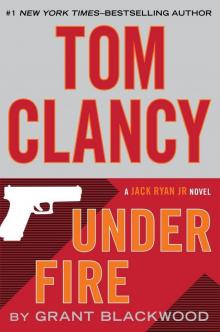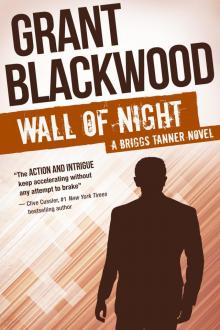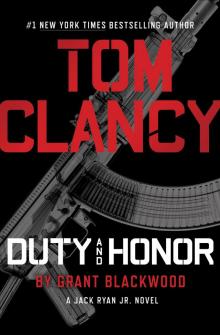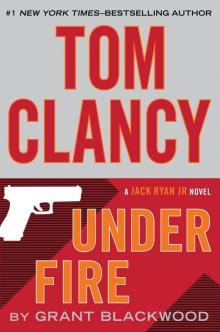- Home
- Grant Blackwood
Dead or Alive Page 2
Dead or Alive Read online
Page 2
Five thousand feet and descending. “Flaps to twenty.”
“Roger flaps twenty,” the pilot acknowledged.
“Gear,” he commanded next, and the copilot reached for the levers. The sound of rushing air entered the cabin as the landing-gear doors opened and the struts came down. Three hundred feet.
“Down and locked,” the copilot replied.
“One hundred feet,” the computer voice said.
The pilot tensed his arms, then relaxed them, easing the aircraft down, gently, gently, picking the proper spot to touch down. Only his skilled senses could tell when the Falcon touched down on the ten-meter concrete squares. He activated the thrustreversers, and the Dassault slowed. A truck with blinking lights showed him where to go and whom to follow as he headed off to where the fuel truck would be waiting.
They were on the ground for a total of twenty minutes. An immigration officer queried them over the radio and determined that there were no changes from the CANPASS data. Outside, the fuel truck’s driver disconnected his hose and secured the fuel valve.
Okay. That’s done, the pilot thought. Now for the second segment of the three-part flight.
The Falcon taxied back out to the north end of the runway, going through the pre-liftoff checklist, as he always did, after waiting at the end of the runway. The acceleration went smoothly; then the wheels came up, then the flaps, followed by the climb-out. Ten more minutes and they were at thirty-seven thousand, their initial assigned altitude from Toronto Center.
They cruised west at Mach 0.81-about 520 knots, or 600 miles per hour true air speed-with their passengers asleep aft while the engines gobbled fuel at a fixed rate of 3,400 pounds per hour. The aircraft transponder broadcast their speed and altitude to the air-traffic-control radars, and aside from that there was no need for radio traffic of any sort. In rough weather they might have requested a different, probably higher, altitude for more comfortable cruising, but Gander tower had been correct. Having passed through the cold front that had opposed their flight into Newfoundland, they might not have been moving at all, except for the muted roar of the jet engines hanging on the tail. Pilot and copilot didn’t even speak very much. They’d flown together enough that they knew all the same jokes, and on such an uneventful flight there was no need to swap information. Everything had been planned, down to the proverbial gnat’s ass. Both wondered what Hawaii might be like. They could look forward to a pair of suites at the Royal Hawaiian, and a long sleep to ward off the inevitable jet lag, sure to accompany the ten hours of additional day they were going to experience. Well, both liked a nap on a sunny beach, and the weather in Hawaii was forecast to be as monotonously perfect as it usually was. They planned a two-day layover before proceeding back east to their home field outside of Geneva, with no scheduled passengers on that leg.
“Moose Jaw in forty minutes,” the copilot observed.
“Time to get back to work, I guess.”
The plan was simple. The pilot got on the HF radio-a hold-over from World War Two-and called Moose Jaw, announcing his approach and his early descent, plus estimated time of arrival. Moose Jaw’s approach control took the information from the area control systems and spotted the transponder alphanumerics on its scopes.
The Dassault began bleeding altitude on a completely normal approach, which was duly noted by Toronto Center. The local time was 0304, or Zulu -4:00, keeping homage to Greenwich Mean/Universal time, four hours to the east.
“There it is,” the copilot announced. The approach lights for Moose Jaw showed up on the black countryside. “Altitude twelve thousand, descending one thousand per minute.”
“Stand by the transponder,” the pilot ordered.
“Roger,” the copilot replied. The transponder was a custom installation, done by the flight crew themselves.
“Six thousand feet. Flaps?”
“Leave ’em,” the pilot commanded.
“Roger. Runway in view.” The sky was clear, and the Moose Jaw approach lights strobed in the cloudless air.
“Moose Jaw, this is Mike Foxtrot, over.”
“Mike Foxtrot, Moose Jaw, over.”
“Moose Jaw, our gear doesn’t want to come down. Please stand by. Over.” That notification woke people up.
“Roger. Are you declaring an emergency, over?” the approach radio inquired at once.
“Negative, Moose Jaw. We’re checking the electrics. Stand by.”
“Roger, standing by.” Just a hint of concern in the voice.
“Okay,” the pilot said to his copilot, “we’ll drop off their scope at one thousand feet.” They’d been through all this, of course. “Altitude three thousand and descending.”
The pilot eased right. This was to show a course change on the Moose Jaw approach radar, nothing serious but a change nonetheless. With altitude dropping it might look interesting on the radar tapes if anyone cared to look, which was doubtful. Another blip lost in the airspace.
Two thousand,” the copilot said. The air was a little bumpier at the lower altitude but not as bumpy as it was going to get. “Fifteen hundred. Might want to adjust the descent rate.”
“Fair enough.” The pilot inched back on the yoke to flatten out the down-angle so that he could level out at nine hundred feet AGL. That was low enough to enter Moose Jaw’s ground clutter. Though the Dassault was anything but stealthy, most civilian traffic-control radars primarily saw transponder signals, not “skin-paints.” In commercial aviation, a plane on radar was nothing more than a notional signal in the sky.
“Mike Foxtrot, Moose Jaw, say altitude, over.”
They’d be doing this for a while. The local tower team was unusually awake. Maybe they’d flown into a training exercise, the pilot thought. Too bad, but not a major problem.
“Autopilot off. Hand-flying the airplane.”
“Pilot’s airplane,” the copilot replied.
“Okay, looping right. Transponder off,” the pilot commanded.
The copilot killed power to transponder one. “Powered off. We’re invisible.” That got Moose Jaw’s attention.
“Mike Foxtrot, Moose Jaw. Say altitude, over,” the voice commanded more crisply. Then a second call.
The Falcon completed its northern loop and settled down on a course of two-two-five. The ground below was flat, and the pilot was tempted to reduce altitude to five hundred feet but decided against it. No need. As planned, the aircraft had just evaporated off the Moose Jaw radar.
“Mike Foxtrot, Moose Jaw. Say altitude, over!”
“Sounds excited,” the copilot observed.
“I don’t blame him.”
The transponder they’d just shut down was for another plane entirely, probably parked in its hangar outside Söderhamn, Sweden. This flight was costing their charter party seventy thousand extra euros, but the Swiss flight crew understood about making money, and they weren’t flying drugs or anything like that. Money or not, that sort of cargo was not worth the trouble.
Moose Jaw was forty miles behind them now, and dwindling at seven miles per minute, according to the plane’s Doppler radar. The pilot adjusted his yoke to compensate for the cross-wind. The computer by his right knee would compute for drift, and the computer knew exactly where they were going.
Part of the way, anyway.
3
IT LOOKED DIFFERENT than it had in the imagery-they always did-but they were in the right place, that was for sure. He felt his exhaustion drain away, replaced by focused anticipation.
Ten weeks earlier a CIA satellite had tapped into a radio transmission here, and another had taken a photo, which Driscoll now had in his pocket. This was it, no question. A triangular formation of rocks over the top identified the spot. It wasn’t decoration, despite its man-made appearance, but rather something left behind by the last set of glaciers that had ground their way through this valley God knew how many thousands of years ago. Probably the same meltwater that had carved the triangle had helped bore out the cave. Or however caves were
formed. Driscoll didn’t know, and didn’t especially care. Some of them were pretty deep, some hundreds of meters deep, perfect safe holes to hide in. But this one had originated a radio signal. And that made it special. Special as hell. It had taken Washington and Langley more than a week to localize this place, but they’d been oh-so-careful following it up. Almost nobody knew about this mission. Fewer than thirty people in total, and most of those were at Fort Benning. Where the NCO club was. Where he and his team would return in less than forty-eight hours. God willing-inshallah, as they said locally. Not his religion, but the sentiment made sense. Driscoll was a Methodist, though that didn’t keep him from having the occasional beer. Mostly he was a soldier.
Okay, how do we do this? he asked himself. Hard and fast, of course, but how to do it hard and fast? He was carrying half a dozen grenades. Three real ones and three M84 flashbangs. The latter were sheathed in plastic instead of steel, heavy on noise-making explosives, made from some kind of mix of magnesium and ammonium to make it seem as though the surface of the sun had paid an unexpected visit, to dazzle and blind anyone nearby. Again, the chemistry and physics of the things didn’t really concern him. They worked damned well, and that was what counted.
The Rangers were not in the business of fair fights. This was combat operations, not the Olympic Games. They might apply first aid to whatever bad guys survived, but that was as far as it went, and only then because survivors tended to be somewhat more talkative than the dead. Driscoll peered again at the cave’s entrance. Somebody had stood right in that spot to make his satellite phone call, and a RHYTHM e-lint satellite had copied it, and a KEYHOLE satellite had marked the location, and their mission had been authorized by SOCOM himself. He stood still, next to a large rock, close enough that his silhouette would blend with it. No evident movement inside. He wasn’t surprised. Even terrorists had to sleep. And that worked for him. Just fine, in fact. Ten meters. He approached with movements that would have appeared comical to the uninitiated, exaggerated straight-up-and-down movements of his feet and lower legs, carefully avoiding loose stones. Then he got there. Dropped to one knee and looked inside. He glanced over his shoulder to ensure that the rest of the team wasn’t bunching up. No worries there. Still, Driscoll felt the flutter of apprehension in his belly. Or was it fear? Fear of screwing the pooch, fear of repeating history. Fear of getting men killed.
A year earlier in Iraq, Captain Wilson’s predecessor, a green second lieutenant, had planned a mission-a straightforward insurgent hunt along the southern shores of Buhayrat (Lake) Saddam, north of Mosel-and Driscoll had concurred. Problem was, the young lieutenant was more interested in filing a glowing report than he was in the safety of his Rangers. Against Driscoll’s advice and with night falling, he’d split the team to flank a bunker complex, but as was their tendency, the hastily redrawn plan didn’t survive its first contact with the enemy-in this case, a company-sized gathering of Saddam ex-army loyalists who encircled and butchered the young lieutenant’s fire team before turning their attention on Driscoll and his men. The fighting withdrawal had taken most of the night, until finally Driscoll and three others made their way back across the Tigris and within range of a firebase.
Driscoll had known the lieutenant’s plan was a disaster in the making. But had he argued strongly enough against it? If he’d pushed it… Well. This was the question that had haunted him for the past year. And now here again in Indian country, but this time all the decisions-good, bad, disastrous-were all his own.
Eye on the ball, Driscoll commanded himself. Head back in the game.
He took another step forward. Still nothing ahead. The Pashto people might be tough-they damned well were tough, Driscoll had learned-but they hadn’t been trained beyond how to point a rifle and pull the trigger. There should have been somebody in the cave entrance doing overwatch. He saw some cigarette butts nearby. Maybe a sentry had been here and run out of smokes. Bad habit, Gomer, Driscoll thought. Bad fieldcraft. Slowly, carefully, he eased inside. His night-vision goggles were a godsend. The cave was straight for about fifteen meters, rough sides, mostly oval-shaped in cross-section. No lights. Not even a candle, but he could see a right turn coming, so Driscoll kept his eyes tuned for light. The cave floor was devoid of clutter. That told the sergeant much: Somebody lived here. They’d been given solid information. Will miracles never cease? Driscoll thought. As often as not, these hunting expeditions turned up nothing but an empty hidey-hole and a bunch of pissed-off Rangers holding their own dicks.
Maybe the right cave? He didn’t often allow himself to think such thoughts. Wouldn’t that be something? Driscoll thought for a bare instant. Big prize, this one. He set the thought aside. The size of the prize didn’t change how they did their jobs.
The soles of his boots were flexible. Easier on his feet, but more important, quiet. He tucked his M4 carbine in close to his shoulder. He’d left his backpack outside. No need for additional weight or bulk inside the cave. Driscoll was not overly big. A hair under six feet, he weighed a hundred and eighty pounds, lean and tough, his blue eyes tracing forward. He had two soldiers a few meters behind him, and while they heard his breathing over the radio links they all carried, he didn’t speak a word. Just hand signals, which were in any case data-dense in their content.
Movement. Somebody was coming their way.
Driscoll dropped to one knee.
The footsteps approached. Driscoll held up his left fist, telling those behind him to drop, as his carbine came up. The footsteps were casual. Alert ones sounded different to his trained ear. This guy was home, and was comfortable there. Well, too bad for him. Behind him, pebbles skittered and Driscoll knew the source; he’d done it before himself: a boot slip. He froze. Around the corner, the footsteps stopped. Ten seconds passed, then twenty. For a full thirty seconds, nothing moved. Then the footsteps began moving again. Still casual.
Driscoll tucked the M4 to his shoulder and turned the corner and there was the gomer. A moment later he had two rounds in the chest and a third one in the forehead, and he went down without a sound. He was older than the one outside, maybe twenty-five, with a mature beard, Driscoll saw. Too bad for you. Driscoll pressed on, stepping around the body and taking the right turn, then pausing to wait for his companions to catch up. Ahead he could see another six meters or so. Nothing directly ahead. Press on. How deep did this cave go? No telling that at the moment. He cradled the carbine tight in his hands.
There was more light ahead, flickering. Candles, probably. Maybe the gomers needed a night-light, like Driscoll’s young kids. Still the cave floor was devoid of clutter. Somebody had cleaned this place up. Why? Driscoll wondered. How long ago?
He kept moving forward.
The next turn was to the left, a shallow, sweeping turn in the limestone rock, and at the next turn, a lot of light-relatively speaking. Without the PVS-17s it would have been a dull glow at most.
That’s when he heard noise. Snoring. Not too far forward. Driscoll wasn’t moving fast, but now he slowed a bit. Time to be careful. He approached the turn, weapon foremost, turning, turning, turning slowly.
There. That’s what he was looking for. Semifinished lumber. Plain old untreated two-by-fours, and those didn’t grow out of the ground. Somebody had carried them in here from civilization, and that somebody had used a saw to cut them and shape them to size.
Sure as hell, somebody lived here, and it wasn’t just a temporary bolt-hole. That was a damned good sign for this cave.
He started to get excited, could feel the tingle of it in his belly. That didn’t often happen to First Sergeant (E-8) Sam Driscoll. His left hand motioned for his companions to close up. They closed to an interval of maybe three meters and followed his lead.
Double-decker bunks. That’s what the lumber was for. Eight of them he could see. All were occupied. Six bunks, six gomers. One even appeared to have a mattress, the blow-up plastic kind you could buy at Gander Mountain. On the floor was a foot-powered air pump. Whoever that
one was, he liked sleeping in comfort.
Okay. Now what? he asked himself. It wasn’t often that he didn’t know what to do, and more often than not he advised his company commander at times like this, but Captain Wilson was stuck on a hilltop ten miles behind them, and that put Driscoll in command, and command was suddenly pretty damned lonely. Worst of all, this wasn’t the last room. The cave went on forward. No telling how far. Oh, shit.
Back to work.
He eased forward. His orders were fairly simple, and for that purpose he had a noise suppressor for his pistol. This he now drew out of his web holster. Moving forward, he reached the first sleeping man. He put his Beretta next to the man’s head and squeezed off the first round. The suppressor worked as advertised. The sound of the cycling pistol action was far louder than the report of the shot itself. He even heard the brass cartridge case rattling on the stone floor with its small, toylike tinkling clatter. Whatever the guy had been dreaming about was now as real as hell. The guys sleeping on the lower bunk went the same way.
It occurred briefly to Driscoll that in the civilian world this would be considered pure murder, but that wasn’t his worry. These guys had thrown their lot in with people who were making war on his country, and it was their fault that they hadn’t mounted a sufficient guard on their quarters. Laziness had consequences, and war had rules, and those rules were hard on those who violated them. Inside of three seconds, the remaining men were dispatched. Maybe they’d get their virgins. Driscoll didn’t know. Nor did he especially care. Nine bad guys down and dead. He moved forward. Behind him, two more Rangers were following, not too close but close enough, pistol up in one case, M4 carbine in the other for overwatch, just like it said in The Book. The cave turned to the right a few feet ahead. Driscoll pressed on, taking time only to breathe. More bunks, he saw. Two of them.
But neither of these was occupied. The cave kept going. He’d been in a bunch of similar caves. A few had stretched on for as much as three, four hundred meters. Most didn’t. Some were mere walk-in closets, but this wasn’t one of those, either. He’d heard that some, in Afghanistan, went on for half of forever, too long for the Russians to defeat them, despite significant measures up to and including filling them with diesel fuel and tossing a match. Maybe gasoline would have been better here, Driscoll thought. Or explosives, maybe. The Afghans were tough enough, and most of them were not afraid to die. Driscoll had never encountered people like that before coming to this part of the world. But they died, just like everybody else, and then the problems they made ended with them.

 End of Enemies
End of Enemies Tom Clancy Under Fire (Jack Ryan Jr. Novel, A)
Tom Clancy Under Fire (Jack Ryan Jr. Novel, A) Dead or Alive
Dead or Alive Echo of War
Echo of War Wall of Night
Wall of Night Tom Clancy Duty and Honor (A Jack Ryan Jr. Novel)
Tom Clancy Duty and Honor (A Jack Ryan Jr. Novel) Sacrificial Lion
Sacrificial Lion Tom Clancy Under Fire
Tom Clancy Under Fire